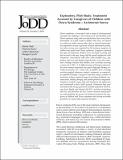| dc.contributor.author | Neil, NIcole | |
| dc.contributor.author | Fiani, Theresa | |
| dc.contributor.author | Mannion, Arlene | |
| dc.contributor.author | Lynch, Meagan | |
| dc.date.accessioned | 2018-07-31T08:57:05Z | |
| dc.date.available | 2018-07-31T08:57:05Z | |
| dc.date.issued | 2018 | |
| dc.identifier.citation | Neil, NIcole, Fiani, Theresa, Mannion, Arlene, & Lynch, Meagan. (2018). Exploratory, Pilot Study: Treatments accessed by caregivers of children with Down Syndrome - An internet survey. Journal on Developmental Disabilities, 23(2) :37-49. | en_IE |
| dc.identifier.issn | 1917-7909 | |
| dc.identifier.uri | http://hdl.handle.net/10379/7442 | |
| dc.description.abstract | Down syndrome is associated with a range of developmental strengths and challenges. The treatment use of individuals with Down syndrome along with associated factors have not yet been determined. In a pilot study to address this issue, we elected
to conduct an online survey rather than a classical representative population survey to generate relevant information quickly.
An online survey was completed by 162 primary caregivers of children and youth with Down syndrome. Caregivers reported
the types of treatments children were currently receiving and had received in the past, along with the overall satisfaction with
treatments. Associations with other child variables (e.g., age, gender, and race) and family characteristics were also examined.
Findings indicate that children were currently receiving a mean of 6.1 (SD = 3.5) different types of therapy treatments; the most common treatments was speech language therapy currently received by 73%. Only 2.4% of children were currently
receiving applied behaviour analytic treatment, an empirically supported therapy. Caregivers reported using a number of
treatments without empirical support including facilitated communication, holding therapy, and auditory/sensory integration.
Caregivers tended to agree that each treatment was efficacious and contributed to their child s growth. Treatments that were
associated with strong agreement included medication (69.8%), care from family and friends (62.8%), assistive technology
(58.3%), and floortime (55.6%). Future research should focus on understanding the process of treatment selection by caregivers of children with Down syndrome and develop accessible guidelines on empirically supported therapies. | en_IE |
| dc.format | application/pdf | en_IE |
| dc.language.iso | en | en_IE |
| dc.publisher | Ontario Association on Developmental Disabilities | en_IE |
| dc.relation.ispartof | Journal on Developmental Disabilities | en |
| dc.rights | Attribution-NonCommercial-NoDerivs 3.0 Ireland | |
| dc.rights.uri | https://creativecommons.org/licenses/by-nc-nd/3.0/ie/ | |
| dc.subject | Down syndrome | en_IE |
| dc.subject | treatment | en_IE |
| dc.subject | survey | en_IE |
| dc.subject | caregiver | en_IE |
| dc.title | Exploratory, Pilot Study: Treatments accessed by caregivers of children with Down Syndrome - An internet survey | en_IE |
| dc.type | Article | en_IE |
| dc.date.updated | 2018-07-05T13:15:29Z | |
| dc.local.publishedsource | http://oadd.org/journal/volume-23-number-2-general2016-rsig-abstracts/ | en_IE |
| dc.description.peer-reviewed | Not peer reviewed | |
| dc.internal.rssid | 14588044 | |
| dc.local.contact | Arlene Mannion, Irish Centre For Autism, & Neurodevelopment Research, School Of Psychology, Nui Galway. Email: arlene.mannion@nuigalway.ie | |
| dc.local.copyrightchecked | Yes | |
| dc.local.version | PUBLISHED | |
| nui.item.downloads | 215 | |


